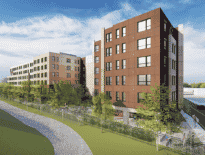Advancing housing affordability and stabilization is a long game that requires collaboration, creative solutions, and quick interventions.
In February, Asian Community Development Corp. (ACDC) successfully acquired a private building in Chinatown, marking the first time a nonprofit has purchased an occupied building in the neighborhood, and the first private acquisition for ACDC. This milestone proved that with a strong team of partners and funders, it is possible to outbid and cash buyers who often don’t have a stake in the community, displace residents and charge exponentially higher rent.
This recent success has increased the organization’s confidence in and experience to pursue more naturally occurring affordable housing projects, which is a quicker strategy to preserve or create more affordable housing. While our new construction projects can take years to come to fruition, this process took about four months to complete.
Augmenting the Development Strategy
We have witnessed how national and global events such as the economic crisis in 2008 and the pandemic can significantly stall or kill a development project. Years of work, from engaging our youth and residents in visioning and planning sessions to obtaining permitting can be lost due to forces outside of our control. This is one of the reasons why ACDC decided to explore private acquisition to supplement our new construction work. However, this strategy also comes with its own challenges.
While private acquisitions move at a much faster pace than new construction or public developments, we’re dealing with a highly competitive market. If you don’t move quickly, you easily lose out on opportunities.
Buying private also means working in a less regulated environment, which requires greater flexibility on both our end and from the funders and having to make quick decisions without having 100 percent of the information in hand. This approach can be riskier, but the stabilization effect could be great on gentrifying neighborhoods such as Chinatown.
To advance affordable housing, ACDC’s approach involves strategies which include exploring any viable opportunities, partnering with experienced housing and real estate professionals, and in the long-term, advocating for policies that sustain and create more affordable housing.
ACDC’s Real Estate team is always researching development opportunities and we moved quickly after learning about the 64-68 Beach St. property. Our organization also built a healthy reserve over the years for occasions like this, to boost our buying power in such a competitive market. It also helped that ACDC’s board of directors were unanimously supportive of pursuing the acquisition.
Having formidable partners in this work has also been crucial. The Beach Street acquisition went well because ACDC had immediate support from the city of Boston. We worked with Sheila Dillon’s team at Boston’s Office of Housing, which allocated ARPA funds to support this acquisition. BlueHub Capital and Local Initiatives Support Corp. (LISC) Boston quickly collaborated and moved to approve additional acquisition financing for the fast-paced Beach Street purchase.
Sellers Notified of CDC’s Intentions

Angie Liou
We give a lot of credit to our responsive funders for answering urgent calls and emails and having the bandwidth and capacity to dive into this process with ACDC. With our experienced and agile team, acquisition materials were quickly prepared and ACDC’s broker led a winning strategy. In addition to making a competitive offer, we included a letter to the sellers explaining our organization’s mission and work, and our community-centered intentions at Beach Street.
Protective measures such as inclusionary zoning ordinances, the Community Preservation Act, the pending Tenants Opportunity to Purchase Act (TOPA), and the prospective Transfer Fee Home Rule, open up more opportunities for tens of millions of dollars towards affordable housing investment that will enable nonprofits compete with for-profit developers and cash

Kyle Sullivan
buyers. Establishing policies like these is why ACDC emphasizes civic participation among our residents. It’s crucial for individuals and groups to support bills that concretely address our most vulnerable constituents’ needs. Community organizers who have direct lines with residents and the advocacy efforts of the Massachusetts Association of Community Development Corporations (MACDC) are also important to this work.
We see our civic engagement and affordable housing efforts tied to our other areas of work that support the holistic well-being of the working-class households and communities we serve, including youth development, creative placekeeping and financial stability. Looking to the future, ACDC will continue employing immediate and long-term strategies while exploring other creative solutions and partnerships so that more people have access to safe and affordable homes.




 |
| 


